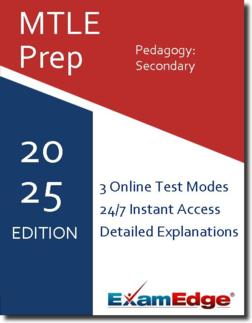MTLE Pedagogy: Secondary (014) Practice Tests & Test Prep by Exam Edge - Test Reviews
Based on 25 Reviews
- Real Exam Simulation: Timed questions and matching content build comfort for your MTLE Pedagogy: Secondary test day.
- Instant, 24/7 Access: Web-based MTLE Pedagogy Secondary (Grades 5-12) practice exams with no software needed.
- Clear Explanations: Step-by-step answers and explanations for your MTLE exam to strengthen understanding.
- Boosted Confidence: Reduces anxiety and improves test-taking skills to ace your MTLE Pedagogy Secondary (Grades 5-12) (014).

MTLE Pedagogy: Secondary (014) Practice Tests & Test Prep by Exam Edge - Review
MTLE Pedagogy Secondary (Grades 5-12) - Reviews
Excellent
Based on
125
reviews
“ I just wanted to write and let you guys know as well that your tests really did help me. I had taken the MTLE Basic Reading Test 6 times before I found this site, and finally on the seventh time of taking that same test, I passed. Thank you guys so much for all of the help! I truly appreciate it! :) ...
Read More
Michel , Bemidji, MN
See why our users from 154 countries love us for their exam prep! Including 25 reviews for the MTLE Pedagogy: Secondary exam.
Exam Edge is an Industry Leader in Online Test Prep. We work with our Institutional Partners to offer a wide array of practice tests that will help you prepare for your big exam. No Matter how niche field of interest might be, were here to help you prepare for your test day.
| 2.8M | 4.5M | |
| Users | Tests Taken | |
| 100K | 19 | |
| Unique Exams | Years in Business | |


